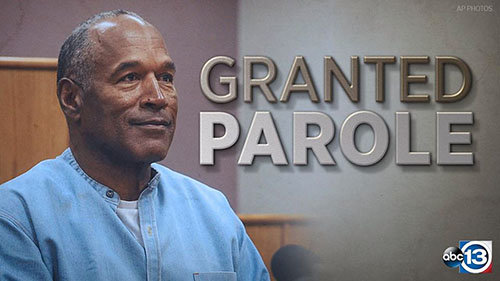Few people in history have had a more enigmatic, paradoxical life than Orenthal James “O.J.” Simpson. In terms of success, he has climbed to the highest mountain. In terms of failure, he has sunk to the lowest valley.
Simpson was a football hero, an actor on the silver screen, a television personality, a sports analyst, an advertising spokesman. And, he was found “not guilty” on two counts of murder before later being convicted of armed robbery and kidnapping.
I remember in 1968 when O.J. Simpson, as the nation’s most outstanding player in college football, stepped onto the platform of the Downtown Athletic Club in the Financial District of Lower Manhattan, New York City to accept the Heisman Trophy.
I remember when he rushed for over 2,000 yards in one season (1973) for the Buffalo Bills, the first NFL player to accomplish that auspicious feat.
Some of you may remember him as Detective Nordberg in the three “Naked Gun” movies. Others will remember him running through the airport in Hertz rental car commercials.
Who can forget the June 17, 1994 murders of O.J.’s ex-wife, Nicole Brown Simpson, and her friend, Ron Goldman. Following the murders there was the remarkable pursuit of O.J. as a suspect in the homicides in a “white Bronco” driven by Al Cowlings, a former college and pro football teammate. The chase across Los Angeles freeways was broadcast live on television around the world.
Six months after the arrest of Simpson the world focused on the trial, which was also televised. Even foreign leaders such as Margaret Thatcher and Boris Yeltsin seemed preoccupied with the trial. When Yeltsin stepped off his plane to meet President Bill Clinton, the first question he asked was, “Do you think O.J. did it?” When the “not guilty” verdict was rendered by the jury, 91 percent of all television viewers were watching as the scene unfolded in the Los Angeles courtroom.
 O.J. Simpson became part of the news cycle again last week, going before a parole board seeking probation from a 2008 armed robbery case involving sports memorabilia. ABC NEWS13/Facebook
O.J. Simpson became part of the news cycle again last week, going before a parole board seeking probation from a 2008 armed robbery case involving sports memorabilia. ABC NEWS13/FacebookThirteen years later, in 2008, Simpson and his partner in crime, C.J. Stewart, were charged with armed robbery and kidnapping and found guilty. Simpson, who was 61 at the time of the verdict, faced the prospect of spending the rest of his life in prison.
For nine years Simpson has been a model prisoner and on Thursday, July 20 the Nevada parole board announced he would be paroled in October although he could have served up to 33 years in prison.
But what is the difference between a parole and a pardon? In Simpson’s case, he will live under the watchful eye of the Nevada Department of Parole. He has indicated his intentions to move to Florida, a state that will undertake “courtesy supervision” and impose its conditions in addition to those already demanded by Nevada.
For example, a parolee is subject to strict monitoring and if the guidelines and conditions of his parole are violated, the Parole Board may return the parolee to prison. A parolee may not possess any firearms. He is also required to submit a monthly report to an assigned supervising officer.
Furthermore, there can be no changing of one’s place of residence without obtaining permission. There shall be no partaking of alcoholic beverages nor the purchase or possession of narcotic drugs. Neither can a parolee associate with individuals with criminal records. The parolee must submit to a search of his person, automobile, or place of residence by a parole officer at any time. Strict accountability is in place at all times.
However, a parole board or commission has absolutely no authority to grant a prisoner a pardon. A pardon can only come from a higher power such as a governor or the president.
A pardon not only releases an inmate from incarceration, but essentially wipes a criminal’s record clean, clears their name, and cancels any further penalties they are facing, allowing them to immediately rejoin society with no criminal past. A pardon frees the prisoner from any mark of their crime.
I am so glad Jesus has not just paroled me, but pardoned me from my sins. His forgiveness is wonderful and complete. In Psalm 103:12 we are told, “As far as the east is from the west, so far hath he removed our transgressions from us.”
God has promised to “cast all our sins into the depths of the sea” (Micah 7:19). We have also been told that the Mariana Trench is the deepest known point in Earth’s oceans at 36,070 feet, almost seven miles below sea level. How grand to know that God has buried our sins so far below the ocean’s surface.
Isaiah 1: 18 tells us, “Though your sins be as scarlet, they shall be as white as snow.” The point is that when God forgives us he does a thorough job of it. Hebrews 8:12 informs us that our confessed and forsaken sins are not even remembered by God.
I am so glad that when Christ redeemed me from the shackles of sin, He didn’t just parole me, but He pardoned me.